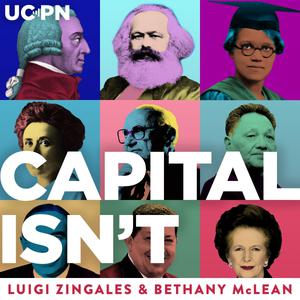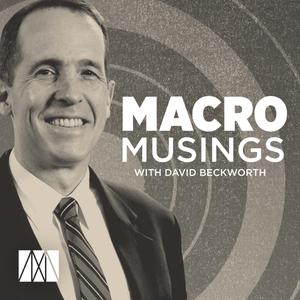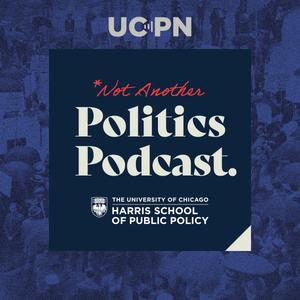
Capitalisn't
University of Chicago Podcast Network
Is capitalism the engine of destruction or the engine of prosperity? On this podcast we talk about the ways capitalism is—or more often isn’t—working in our world today. Hosted by Vanity Fair contributing editor, Bethany McLean and world renowned economics professor Luigi Zingales, we explain how capitalism can go wrong, and what we can do to fix it. Cover photo attributions: https://www.chicagobooth.edu/research/stigler/about/capitalisnt. If you would like to send us feedback, suggestions for guests we should bring on, or connect with Bethany and Luigi, please email: contact at capitalisnt dot com. If you like our show, we'd greatly appreciate you giving us a rating or a review. It helps other listeners find us too.
- 48 minutes 59 secondsIs Private Credit In The Public Interest? with Jim Grant
The meteoric rise of private credit over the last decade has raised concerns among banks about unfair competition and among regulators about risks to financial stability.
Historically, regulated banks have provided most of the credit that finances businesses in the United States. However, since the 2008 financial crisis, banks have restricted their credit lines in response to new regulations. In their place has arisen private credit, which comprises direct (and mostly unregulated) lending, primarily from institutional investors. Estimates peg the current size of outstanding private credit loans in the U.S. at $1.7 trillion.
Private credit loans aren't traceable, and there are incentives to lend to riskier borrowers in the absence of regulation. This could lead to catastrophic spillover effects in the event of a financial shock. This week, Bethany and Luigi sit down with Jim Grant, a longtime market and banking industry analyst, writer, and publisher of Grant's Interest Rate Observer, a twice-monthly journal of financial markets published since 1983. Together, they try to answer if private credit is in the public interest.
25 April 2024, 11:00 am - 48 minutes 51 secondsRalph Nader's Capitalism
"The only true aging is the erosion of one's ideals," says Ralph Nader, the former third-party presidential candidate who just turned 90 after more than 60 years of consumer advocacy and fighting for small business in America. From influencing the transformative passage of car safety legislation to advancing numerous environmental protection and public accountability causes, Nader has fought against the proliferation and insinuation of corporate power in our government.
In between all of that, Nader has also found the time to develop a prolific writing career. In this week’s episode, Nader joins Bethany and Luigi to discuss his new book, "Rebellious CEO: 12 Leaders Who Got It Right." The three talk about the possibilities of ethically profitable business, Nader’s lifelong pursuit of justice, his views on the state of capitalism today, the political disillusionment of the public, and how we can reclaim democratic control of capitalism.
11 April 2024, 11:00 am - 49 minutes 54 secondsThe New Business Of News, with Ben Smith
Given the recent mass layoffs, acceleration of media consolidation, continued decline of local journalism, and rapid uptake of generative AI, the news industry—fundamental to institutional accountability in capitalist democracies—appears to be in deep crisis. Joining Bethany and Luigi to make the case that journalism can not only survive but thrive is Ben Smith, longtime journalist, former New York Times media columnist, co-founder of global digital news publication Semafor, and the author of "Traffic: Genius, Rivalry, and Delusion in the Billion-Dollar Race to Go Viral."
How much of today's state of journalism can be attributed to mistakes and how much to inevitability? Where does the marriage between social media and news go next? How can journalism remain financially viable? Offering a nuanced perspective on the opportunities and pitfalls facing the news industry today, the three of them discuss the future of journalism in the age of clicks and a path back to a media landscape that informs, educates, and holds power to account.
28 March 2024, 11:00 am - 48 minutes 17 secondsPoverty in America: Terrible Scourge or a Measurement Error?
Perhaps the biggest evidence that capitalism in America doesn’t work, at least not for everyone, is growing income inequality and the persistence of poverty. But what is the current state of poverty and inequality in the United States? Why do debates still persist about whether poverty has been eradicated? What do the numbers and official statistics tell us, and should we believe them? What do personal stories and experiences with poverty tell us that data cannot? If poverty has indeed been eradicated, what led to that achievement – and if it still persists, what more can be done to abolish it?
Last year on this podcast, we did a series about this topic, and we found these episodes to be surprising and more informative than most of the debates about poverty you’ll hear on the news. So, we wanted to condense that series down into a single episode that captures all of the highlights. The first speaker is former U.S. Senator Phil Gramm (R-TX), who argues in his recent book, "The Myth of American Inequality," that poverty is vastly overstated because official government data does not include transfer payments. The second is Princeton sociologist and Pulitzer Prize-winning author Matthew Desmond, who argues in his recent book, "Poverty, by America," that poverty is a terrible scourge, that we have made no progress, and that it is a moral outrage.
The result is a nuanced, surprising, and informative debate on a multifaceted but important issue – leaving our hosts, as well as, by extension, our listeners – to formulate their own takeaways on what we can all do about them.
Episode notes:
- Listen to the complete conversation with Sen. Phil Gramm
- Listen to the complete conversation with Dr. Matthew Desmond
14 March 2024, 11:00 am - 49 minutes 30 secondsWhen a Few Financial Institutions Control Everything, with John Coates
In his recent book, "The Problem of Twelve: When a Few Financial Institutions Control Everything," Harvard law professor John Coates sheds light on the secrecy, lack of public accountability, concentrated power, and the disproportionate influence of a select few institutions in our financial system.
Coates joins Bethany and Luigi to dissect the potential dangers of this era of financial consolidation and explore possible solutions, including accountability and transparency, to ensure a more equitable economic system. Specifically examining the "Big Four" index funds (Vanguard, State Street, Fidelity, and BlackRock) — that collectively hold more than twenty percent of the votes in S&P 500 companies — and the transformative rise of private equity funds, they discuss the challenges posed by concentrated financial power and its impact on markets, economies, and society at large.
Show Notes:
- Read an excerpt of Coates' book (Columbia Global Reports) on ProMarket
- Revisit our earlier conversation with Hélène Landemore, referenced by Luigi in this episode
- "The book is available via Columbia Global Reports."
29 February 2024, 12:00 pm - 50 minutes 5 secondsIs Short Selling Dead? With Jim Chanos
The Wall Street Journal wrote that “Wall Street's best-known bear is going into hibernation" after the legendary short seller Jim Chanos announced he would close his main hedge funds late last year, in part due to diminishing interest in stock picking. Short selling, which bets on drops in asset prices, wins when companies and governments fail and has gained a predatory reputation over the years. Just last week, the China Securities Regulatory Commission vowed "zero tolerance" against what they called "malicious short sellers," according to Reuters.
One of our listeners wrote to Bethany with this question: “What does it say about capitalism if Jim Chanos can’t find enough investors willing to profit from its frauds, fads, and failures, not to mention the competitive forces that are necessary for a functioning market? Is short selling dead?” To discuss this, Luigi and Bethany sat down with Chanos himself, who has been cast as the “Darth Vader of Wall Street,” the “Catastrophe Capitalist,” and the “LeBron James of short selling.” Together, they discuss the relationship between short sellers and our information environment, the fallout from the "meme stock" craze, the effects of the Federal Reserve’s interest rate policies, and how short selling can contribute to market efficiency and resilience. Do short sellers play a positive role by uncovering corporate fraud, mismanagement, and systemic risks? What safeguards are necessary to prevent short-selling abuse and ensure fair and transparent markets?
15 February 2024, 12:00 pm - 43 minutes 36 secondsManufacturing Influence, with Emily Hund
According to the latest industry statistics, the global influencer economy grew from $1.7 billion in 2016 to $21.1 billion in 2023 — and it's only expected to grow exponentially from here with advances in artificial intelligence. In 1988, Noam Chomsky and Edward S. Herman investigated how mass media sways audiences to conform to social norms without coercion, or what they called “manufacturing consent.” In her new book, “The Influencer Industry: The Quest for Authenticity on Social Media,” Dr. Emily Hund investigates how social media influencers have manufactured a new media economy to which we’ve unwittingly consented.
Hund, a research affiliate at the Center on Digital Culture and Society at the University of Pennsylvania’s Annenberg School for Communication, joins Bethany and Luigi to unpack this new digital landscape where influence has become a powerful currency, shaping not only news consumption and consumer behavior but the very fabric of modern capitalism. Together, they discuss whether influencers are empowered entrepreneurs rewriting market rules or victims of a system that commodifies identity. What are the hidden incentives driving influencer messaging and, thus, the news and content we receive?
Read an excerpt from Hund's book (Princeton University Press, 2023) on ProMarket.
1 February 2024, 12:00 pm - 38 minutes 45 secondsThe Capitalisn't of Banking, with Anat Admati
It's been nearly 16 years since the federal government bailed out Wall Street to the tune of $700 billion in response to the financial crisis that precipitated the Great Recession. The idea that the public must guarantee critical financial institutions that are “too big to fail” was controversial then, but does it still remain an issue? Stanford finance professor Anat Admati, whom the New York Times profiled in an article titled "When She Talks, Banks Shudder," argues it’s become worse.
Admati joins Bethany and Luigi to discuss the updated edition of her and Martin Hellwig’s book, The Bankers' New Clothes: What’s Wrong with Banking and What to Do About It. Dissecting new financial developments, including the failure of Silicon Valley Bank, the crypto industry, and shadow banking, Admati lays bare how the current financial system is rigged for the benefit of the few. She also prescribes how we can build and regulate a fairer and more accountable financial system and, thus, a more stable and equitable capitalist economy.
Show Notes:
- Read the 2024 preface of The Bankers' New Clothes on ProMarket.
- Revisit our 2019 conversation with Anat and Chicago Booth Professor Guy Rolnik, exploring the reasons why market and policy may fail in finance and technology and what we must do to address such failures.
- Read Anat's contributions to our e-books on George Stigler and Milton Friedman.
18 January 2024, 12:00 pm - 1 hour 4 minutesAsk Luigi Zingales Anything
After two seasons and 163 episodes, Capitalisn’t hosted its first-ever live event late last year. As part of the University of Chicago Podcast Festival, co-host Luigi Zingales fielded questions from three UChicago undergraduate students — Surya Gowda, Mete Bakircioglu, and Giuseppe Di Cera —and an in-person audience in an “Ask Me Anything.”
From the evolution of competition policy to the impact of greener energy sources on prices, from the challenges of regulating the shadow economy to Luigi's struggles with his favorite soccer team, here is our “Ask Me Anything” episode.
If you wish to submit your own question for our forthcoming mailbag episode, please do so here. https://www.speakpipe.com/Capitalisnt
4 January 2024, 12:00 pm - 52 minutesWho Controls AI? With Sendhil Mullainathan
The firing, and subsequent rehiring, of OpenAI CEO Sam Altman raises fundamental questions about whose interests are relevant to the development of artificial intelligence and how these interests should be weighed if they hinder innovation. How should we govern innovation, or should we just not govern it at all? Did capitalism "win" in the OpenAI saga?
Bethany and Luigi sit down with Luigi’s colleague Sendhil Mullainathan, a professor of Computation and Behavioral Science at Chicago Booth. Together, they discuss if AI is really "intelligent" and whether a profit motive is always bad. In the process, they shed light on what it means to regulate in the collective interest and if we can escape the demands of capitalism when capital is the very thing that's required for progress.
21 December 2023, 12:00 pm - 48 minutes 17 secondsRaghuram Rajan’s Vision Of An Indian Path To Development
After discussing the trajectory of China's economy earlier this year, Luigi and Bethany turn their attention to the future of another global economic behemoth: India. Joining them is renowned Indian economist Raghuram Rajan, who has a brand-new book out this week, "Breaking the Mould: Reimagining India's Economic Future" (co-authored with Rohit Lamba).
In "Breaking the Mould," Rajan and Lamba make the controversial and counterintuitive argument that India should follow an economic development path that is based not on manufacturing, as China has done, but rather on services. In this conversation, we discuss why India's strengths play to services-based development, how India can deal with the economic and educational inequality created by its past, how Western business should engage with India, and why democracy is critical to India's future economic success.
We think his perspectives are important for Indian citizens and policymakers, but also for global citizens and policymakers given the critical role India will play in shaping the world of the future.
8 December 2023, 12:00 pm - More Episodes? Get the App
Your feedback is valuable to us. Should you encounter any bugs, glitches, lack of functionality or other problems, please email us on [email protected] or join Moon.FM Telegram Group where you can talk directly to the dev team who are happy to answer any queries.
 Odd Lots
Odd Lots
 Macro Musings with David Beckworth
Macro Musings with David Beckworth
 EconTalk
EconTalk
 Big Brains
Big Brains
 Not Another Politics Podcast
Not Another Politics Podcast
 The Capitalism and Freedom in the Twenty-First Century Podcast
The Capitalism and Freedom in the Twenty-First Century Podcast